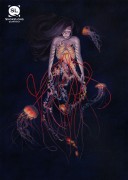The seven detectives lived together in a rented house. Two shared a bedroom, four had their own rooms, and one slept on the screened-in back porch, where it was darkest. All were men. All answered the advertisement for rooms and were not surprised to see the others. All had origins they did not share and, in an immediate and unspoken rule, did not investigate.
One burnt toast. Another listened to opera. A third practiced chess openings. Keys never went misplaced for long and socks found their mates. Neighborhood pets were tracked down in return for homemade crumb cake. They often couldn’t help themselves. They wiped fingerprints from the faucet, the fridge. One steamed open his mail. They photographed dog walkers from the gaps between curtains. They called in take-out Chinese orders and trailed the delivery boys. They tapped receivers, fastened microphones to the undersides of lampshades. They listened at each other’s doors, put their ears to the walls. They didn’t want to miss a thing. One went too far and discovered that another was responsible for the loss of his license, that he’d been hired to follow and photograph him taking bribes. This detective murdered the other, and the rest of them quickly solved the case. The perpetrator went to prison. Then there were five.
It was only at night that each felt free to lose himself. The roommates took trains to bars in foreign neighborhoods, where no one knew their names. Another kept to his room, searched the air for shortwave radio signals and smoked until dawn. The fourth listened to Don Giovanni in the attic and timed his crying to the loud parts. And the one who slept on the porch pondered what couldn’t be shared with the others, what no microphone could pick up or surveillance camera reveal: how the signs of her leaving, of her drawing away from him, had escaped him for months, even years. How his mind looked back on shoes, toothbrushes, receipts, glances—what they meant, what they foretold. This last detective lay on his cot, deep in the darkness and drowning of crickets. He studied the stars and the riddle of their existence, unsettled by the clues around him that he might be failing to notice, by the mysteries in his life he could never solve.

Notes from Guest Reader Art Taylor
I always admire fiction that can both play with and build intelligently on the forms and the elements of genre fiction, particularly when it’s my own chosen genre of crime fiction. This story does just that—in a piece that can be read as a parody but that also comments on and illuminates some of the deeper issues and concerns at the core of the classic detective story.

